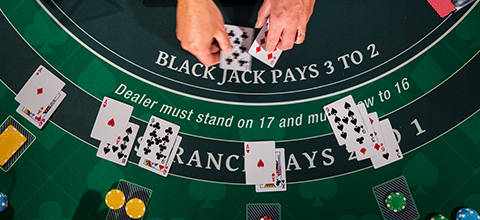
What is Insurance in Blackjack?
A question that we often see from our blackjack players is, ‘how does insurance work in blackjack?’ The good news is that the concept is fairly simple. When the dealer shows an ace, players can place a blackjack insurance bet that pays out 2:1 if the dealer has blackjack. While this might seem like a great bet in the event of likely loss, insurance bets are quite controversial. Many players swear off them entirely, while others use them a bit too much.
If you would like to try out insurance bets on your own, it is commonly available in both online and live casino blackjack. If you would simply like a bit more information, we’ll go over everything you need to know below.
What is the insurance bet in blackjack?
What is insurance in blackjack? Insurance is a separate bet that is only available to players when the dealer shows an ace. It requires a separate bet (typically half your bet) from your main wager. If the dealer has blackjack and you’ve made an insurance bet, your bet earns you a 2:1 payout. If they don’t have blackjack, you lose the bet entirely.
How the insurance bet works – step by step
You now know a bit about when and why you can place insurance bets, but how exactly does the bet work? Don’t worry, in this section, blackjack insurance is explained in more detail.
In general, there are four main steps to an insurance bet:
-
- First, the dealer must show an ace.
-
- When the dealer has an ace upcard, the player is offered an ‘insurance’ bet.
-
- To make the side bet, the player chooses to bet half their original wager.
-
- After the wager has been made, the dealer checks for blackjack:
-
If yes: Insurance pays 2:1 – original bet likely lost.
-
If no: Insurance bet is lost – game proceeds.
| Original bet | Insurance bet | Dealer hand | Outcome | Net result |
|---|---|---|---|---|
| £10 | £5 | Blackjack | +£10 | Break even |
| £10 | £5 | No blackjack | -£5 | Game continues |
Should you take insurance in blackjack?
Is insurance a good bet in blackjack? Opinions here vary. Most players consider blackjack to be a bad bet in most situations due to its poor odds. Remember that the dealer only as a roughly 31% chance of a blackjack, which means that there is a roughly 70% chance that players will lose both their main bet and their insurance bet. The side bet also carries a house edge of around 7.5%, making it one of the least favourable side bets in the game.
Common misconceptions about insurance
Before you add an insurance bet to your round, there are some misconceptions to keep in mind. First, insurance bets are not ‘protecting’ your hand. On the contrary, these are separate bets you place when each round starts, which means that you are adding bets to your hand that don’t need to be there and increasing the amount of money you wager per turn.
Another misconception we see a lot is that insurance bets ensure a win. This could not be further from the truth! Not even the most skilled players can guarantee a win, and you are just as likely to lose the round whether you make an insurance bet or not.
Finally, remember that insurance bets are not the same thing as even-money bets, though they are similar at first glance. Even money is sometimes considered a special kind of insurance bet. When the dealer has an ace showing, players can make an even-money bet that offers a certain 1:1 payout when the dealer has blackjack.
When (if ever) should you use insurance?
Something we see a lot at LeoVegas is players overusing the insurance bet. While it can be tempting to add this side bet to every round, it is important to be strategic. If you bet insurance all the time, you’re impacting your long-term profit.
So, when should you take insurance in blackjack? There are a few simple recommendations to keep in mind. First, only consider the side bet in very specific card counting conditions, assuming that you understand deck composition and card tracking. If you don’t, this isn’t the best side bet for your game. Avoid it entirely when playing casually or for fun!
Insurance vs even money in blackjack
As we mentioned briefly above, even-money bets are offered when the dealer shows an ace. Insurance bets are mechanically the same as even-money bets in blackjack, but they’re phrased differently. The main difference between the two bets is that an even-money bet pays 1:1 automatically before the dealer checks for blackjack.